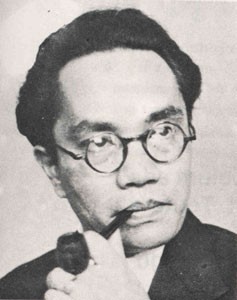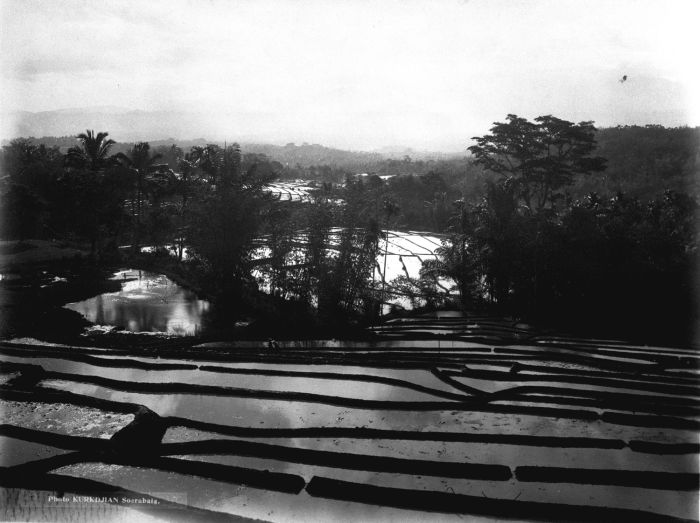|
Wikana
Wikana (16 October 1914 – 1966) was an Indonesian minister and independence leader. He was one of the youths who forced Sukarno and Hatta to declare independence immediately after the surrender of the Japanese. He was the first Indonesian Minister of Youth and Sport (although in his era the office was called Minister of State for Youth Affairs). He was a member of the Indonesian Communist Party. Sometime after the 1965 coup d'état attempt, he was arrested and went missing. Biography Early life Wikana was born on 16 October 1914 in Sumedang. He was the fourteenth child of sixteen. His father was Raden Haji Soelaiman, from Demak, and his mother was Nonoh. His brother was Winanta, an exile to Boven Digul, according to Soemarsono, one of youth leaders generation '45. Wikana attended a Dutch-speaking Europeesch Lagere School (ELS) and continued his study to a Meer Uitgebreid Lager Onderwijs school (MULO). After graduating from MULO, Wikana became a contributor to theBandung week ... [...More Info...] [...Related Items...] OR: [Wikipedia] [Google] [Baidu] |
Sukarni
Sukarni Kartodiwirjo (14 July 1916 – 7 May 1971) was an Indonesian freedom fighter and activist who demanded independence for Indonesia during the Dutch colonial era and the Japanese occupation, and was the chairman of the Murba Party until his death. Biography Sukarni was born on 14 July 1916 in Sumberdiran, Garum, Blitar. The name Sukarni in Javanese means "to pay more attention". He was the fifth child of Dimun Kartodiwirjo, son of Prince Diponegoro's right-hand man Onggomerto, and Supiah, a woman from Kediri. Sukarni's older siblings were Hono, Sukarlim, Sukarmilah, Sukardi, while the younger siblings were Suparti, Endang Sarti, Endi Sukarto, Sukarjo, and an unnamed sibling who died as a child. Sukarni studied at Mardisiswo in Blitar, similar school to Taman Siswa that time. Sukarni continued to study at Hollandsch-Inlandsche School (HIS; Dutch school for natives). When Sukarni graduated from HIS and registered for Meer Uitgebreid Lager Onderwijs (MULO; secondary school ... [...More Info...] [...Related Items...] OR: [Wikipedia] [Google] [Baidu] |
Proclamation Of Indonesian Independence
The Proclamation of Indonesian Independence ( id, Proklamasi Kemerdekaan Indonesia, or simply ''Proklamasi'') was read at 10:00 on Friday, 17 August 1945 in Jakarta. The declaration marked the start of the diplomatic and armed resistance of the Indonesian National Revolution, fighting against the forces of the Netherlands and pro-Dutch civilians, until the latter officially acknowledged Indonesia's independence in 1949. The document was signed by Sukarno (who signed his name "Soekarno" using the Van Ophuijsen orthography) and Mohammad Hatta, who were appointed president and vice-president respectively the following day. The date of the Proclamation of Indonesian Independence was made a public holiday by a government decree issued on 18 June 1946. Background The beginnings of the independence movement In 1918, the Dutch authorities in the Dutch East Indies established a partly-elected People's Council, the ''Volksraad'', which for the first time gave Indonesian nationalists a ... [...More Info...] [...Related Items...] OR: [Wikipedia] [Google] [Baidu] |
Sukarno
Sukarno). (; born Koesno Sosrodihardjo, ; 6 June 1901 – 21 June 1970) was an Indonesian statesman, orator, revolutionary, and nationalist who was the first president of Indonesia, serving from 1945 to 1967. Sukarno was the leader of the Indonesian struggle for independence from the Dutch colonialists. He was a prominent leader of Indonesia's nationalist movement during the colonial period and spent over a decade under Dutch detention until released by the invading Japanese forces in World War II. Sukarno and his fellow nationalists collaborated to garner support for the Japanese war effort from the population, in exchange for Japanese aid in spreading nationalist ideas. Upon Japanese surrender, Sukarno and Mohammad Hatta declared Indonesian independence on 17 August 1945, and Sukarno was appointed president. He led the Indonesian resistance to Dutch re-colonisation efforts via diplomatic and military means until the Dutch recognition of Indonesian independence ... [...More Info...] [...Related Items...] OR: [Wikipedia] [Google] [Baidu] |
Amir Sjarifuddin
Amir Sjarifuddin Harahap ( EVO: Amir Sjarifoeddin Harahap; 27 April 1907 – 19 December 1948) was an Indonesian politician and journalist who served as the second prime minister of Indonesia from 1947 until 1948. A major leader of the left-wing during the Indonesian National Revolution, he previously served as Minister of Information from 1945 until 1946 and Minister of Defense from 1945 until 1948. Amir was born into the Sumatran aristocracy, and was educated at Leiden University. At Leiden, he became a member of the board of the Gymnasium student association in Haarlem, and was involved in the Batak student organization '' Jong Batak''. He returned to Indonesia due to family troubles, but continued his education at the '' Rechts Hogeschool'' in Batavia. After graduating, he became active in literary and journalist circles, joining the editorial board of the newspaper ''Panorama''. He also became involved with left-wing politics, and led a group of younger Marxist ... [...More Info...] [...Related Items...] OR: [Wikipedia] [Google] [Baidu] |
Shigetada Nishijima
Shigetada Nishijima (西嶋重忠) (4 June 1911 – 9 December 2006) was a Japanese scholar, former spy and lobbyist. He was active in Indonesia before, during and after the Japanese occupation of Indonesia, and became a major figure on the Japanese side of the Indonesian National Revolution. Between the 1950s and the 1960s, he was a lobbyist and an intermediary, linking Japanese and Indonesian interests. Later on, he became a scholar of and published memoirs of his time in Indonesia. Early life Nishijima was born on 4 June 1911. According to himself, he was expelled from his high school due to his socialist leanings, and he worked at an ice factory until 1937, when he moved to the Dutch East Indies. Moreover, in an interview Nishijima remarked that his political leanings resulted in him being arrested three times in the 1930s, with two years' imprisonment after his third arrest. He had also studied German in Tokyo. Career After being recruited by the Japanese Naval Intelligence to s ... [...More Info...] [...Related Items...] OR: [Wikipedia] [Google] [Baidu] |
West Java
West Java ( id, Jawa Barat, su, ᮏᮝ ᮊᮥᮜᮧᮔ᮪, romanized ''Jawa Kulon'') is a province of Indonesia on the western part of the island of Java, with its provincial capital in Bandung. West Java is bordered by the province of Banten and the country's capital region of Jakarta to the west, the Java Sea to the north, the province of Central Java to the east and the Indian Ocean to the south. With Banten, this province is the native homeland of the Sundanese people, the second-largest ethnic group in Indonesia. West Java was one of the first eight provinces of Indonesia formed following the country's independence proclamation and was later legally re-established on 14 July 1950. In 1966, the city of Jakarta was split off from West Java as a 'special capital region' (), with a status equivalent to that of a province, while in 2000 the western parts of the province were in turn split away to form a separate Banten province. Even following these split-offs, West Java is ... [...More Info...] [...Related Items...] OR: [Wikipedia] [Google] [Baidu] |
Indonesian National Party
The Indonesian National Party ( id, Partai Nasional Indonesia, PNI) was the name used by several nationalist political parties in Indonesia from 1927 until the 2000s. The first PNI was established by future President Sukarno. After independence, the new PNI supplied a number of prime ministers, and participated in the majority of cabinets in the 1950s and 1960s. The party was fused into the Indonesian Democratic Party in 1973. In the years following the reforms of the late 1990s, a number of parties claiming to be the continuation of previous PNIs stood in elections, but gained only a handful of seats. Pre-independence In November 1925, Sukarno, then a young engineer studying at the Bandung Technical College, founded the ''Algemeene Studie Club'', a study club inspired by a similar organization founded by Soetomo in Surabaya. The study club was later reformed on 4 July 1927 into a movement called the Indonesian National Association. In May 1928, the name was changed to the Indonesia ... [...More Info...] [...Related Items...] OR: [Wikipedia] [Google] [Baidu] |
Preparatory Committee For Indonesian Independence
The Preparatory Committee for Indonesian Independence ( id, Panitia Persiapan Kemerdekaan Indonesia), PPKI, ja, 独立準備委員会, Dokuritsu Junbi Iinkai, lead=yes) was a body established on 7 August 1945 to prepare for the transfer of authority from the occupying Japanese to Indonesia. It approved and promulgated the first Indonesian constitution, and appointed Sukarno president. Background In two sessions from May to July 1945, the Investigating Committee for Preparatory Work for Independence (BPUPK) decided on Pancasila as the ideological basis of independent Indonesia, and produced a draft constitution. With the war turning against them, the Japanese, who were occupying Indonesia, decided to grant independence in order to create problems for the returning Dutch colonial authorities. The plan was that Java would become independent in early September, followed shortly by the rest of the country. On 7 August, the day after an atomic bomb was dropped on Hiroshima, Lt. Ge ... [...More Info...] [...Related Items...] OR: [Wikipedia] [Google] [Baidu] |
Iwa Kusumantri
IWA may refer to: Organizations International * International Water Association * International Webmasters Association * International Woodworkers of America, United States and Canada * International Workers Association, an anarcho-syndicalist federation of labour unions * International Workingmen's Association (1864–1876), also known as the First International United Kingdom * Indian Workers' Association * Inland Waterways Association, a canal charity * Institute of Welsh Affairs, a policy think-tank Elsewhere * Independent Wrestling Association Mid-South, United States * International Wrestling Alliance, Canada * International Wrestling Association (other), various national bodies * Irish Wheelchair Association, Ireland Places * Iwa, Nepal, a defunct municipality (village development committee) * Phoenix-Mesa Gateway Airport, Mesa, Arizona, US (FAA code: IWA) Other uses * Great frigatebird ( haw, 'iwa, link=no), an avian species ** Hurricane Iwa, a late-1982 stor ... [...More Info...] [...Related Items...] OR: [Wikipedia] [Google] [Baidu] |
Achmad Soebardjo
Achmad Soebardjo Djojoadisoerjo (23 March 1896 – 15 December 1978) was a diplomat, one of Indonesia's founding fathers, and an Indonesian national hero. He was the first Foreign Minister of Indonesia. In 1933, he received the degree '' Meester in de Rechten'' from Leiden University, Netherlands. Early life Achmad Soebardjo was born in Teluk Jambe, Karawang Regency, West Java, on 23 March 1896. His father was Teuku Muhammad Yusuf, an Acehnese patrician from Pidie. His paternal grandfather was an ulama and his father was the chief of police in Teluk Jambe, Karawang. His mother was Wardinah. She was of Javanese- Buginese descent, from ''Camat'' in Telukagung, Cirebon. Initially, his father gave him the name Teuku Abdul Manaf, but his mother gave him the name Achmad Subardjo. Djojoadisoerjo was added by himself after he was arrested and imprisoned in Ponorogo Prison because of his involvement with the "July 3, 1946 Incident". He studied at Hogere Burgerschool Jakarta in 1917. ... [...More Info...] [...Related Items...] OR: [Wikipedia] [Google] [Baidu] |
Surrender Of Japan
The surrender of the Empire of Japan in World War II was announced by Emperor Hirohito on 15 August and formally signed on 2 September 1945, bringing the war's hostilities to a close. By the end of July 1945, the Imperial Japanese Navy (IJN) had become incapable of conducting major operations and an Allied invasion of Japan was imminent. Together with the United Kingdom and China, the United States called for the unconditional surrender of the Japanese armed forces in the Potsdam Declaration on 26 July 1945—the alternative being "prompt and utter destruction". While publicly stating their intent to fight on to the bitter end, Japan's leaders (the Supreme Council for the Direction of the War, also known as the "Big Six") were privately making entreaties to the publicly neutral Soviet Union to mediate peace on terms more favorable to the Japanese. While maintaining a sufficient level of diplomatic engagement with the Japanese to give them the impression they might be wi ... [...More Info...] [...Related Items...] OR: [Wikipedia] [Google] [Baidu] |





